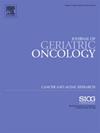接受重大肿瘤手术的老年患者的特征:来自老年外科验证计划的见解。
IF 3
3区 医学
Q3 GERIATRICS & GERONTOLOGY
引用次数: 0
摘要
引言:目前缺乏研究概述了在接受重大肿瘤手术的老年人中老年医学状况和综合征的独特负担,以及对这一人群护理目标的理解。材料和方法:我们对入选美国外科医师学会老年外科验证计划(GSV)的最初50例患者进行了单机构综述,该计划针对2023年期间接受重大肿瘤手术的≥65岁患者。患者变量被分为四个领域——躯体、功能、心理和社会。通过将GSV队列与2021年以来的历史对照进行比较,以患者的护理目标作为感兴趣的结果,分析了GSV的影响。结果:参与者平均年龄为75.4岁(±7.5岁)。他们大多是白人(72%),说英语的(78%),性别分布相似(54%为女性)。在躯体类别中,近40%的人处于中高营养风险,61.5%的人的老年8分≤14分。在功能类别中,34.7%使用手杖或助行器,6.4%有跌倒史,22.4%有一定程度的虚弱。在心理方面,大约70%的人有不同程度的抑郁。在43%的患者中确定了谵妄的危险因素。在社会类别中,超过一半(54.3%)的患者从未结婚、丧偶或离婚。23.3%的财务困境筛查呈阳性。关于护理目标,大多数患者(79.3%)报告希望保持独立性,而只有37.9%报告延长生命是主要关注的问题。使用综合不良结局(CAE)变量,包括出院后30天死亡率和住院率作为这些目标的替代指标,我们发现GSV组30天CAE率为8.0%,而历史对照组为28.9% (p = 0.01)。讨论:我们发现高比例的患者有低G8评分、虚弱、围手术期跌倒和谵妄的风险、缺乏社会支持和经济困难。为了满足这一人群的护理目标,一个全面的老年外科计划对于术前捕捉和减轻危险因素至关重要。本文章由计算机程序翻译,如有差异,请以英文原文为准。
Characteristics of older patients undergoing major oncological surgery: Insights from the Geriatric Surgery Verification Program
Introduction
Studies outlining the unique burden of geriatric medical conditions and syndromes among older adults undergoing major oncological surgery are lacking, along with understanding of the goals of care for this population.
Materials and Methods
We conducted a single-institutional review of the initial 50 patients who enrolled in the American College of Surgeons' Geriatric Surgery Verification Program (GSV) program implemented for those ≥65 years undergoing major oncological surgery during the year 2023. Patient variables were categorized into four domains - somatic, functional, psychological, and social. The impact of GSV was analyzed by comparing the GSV cohort to historical controls from 2021 using patients' goals of care as the outcome of interest.
Results
The mean age of participants was 75.4 years (± 7.5). They were mostly White (72 %), English-speaking (78 %), with similar distribution of sex (54 % female). In the somatic category, nearly 40 % were at moderate to high nutrition risk and 61.5 % had a Geriatric 8 score of ≤14. In the functional category, 34.7 % used a cane or walker, 6.4 % had history of falls, and 22.4 % had some degree of frailty. In the psychological category, >70 % reported some degree of depression. Delirium risk factors were identified in 43 % of the patients. In the social category, more than half (54.3 %) of patients were never married, widowed, or divorced. Financial distress screening was positive in 23.3 %. In regard to goals of care, most patients (79.3 %) reported wanting to maintain independence while only 37.9 % reported extending life as primary concern. Using a composite adverse outcome (CAE) variable incorporating 30-day mortality and institutionalization 30-days after discharge as surrogate for these goals, we found that GSV group had an 8.0 % 30-day CAE rate compared to 28.9 % in the historical controls (p = 0.01).
Discussion
We found high proportions of patients with low G8 score, frailty, perioperative risk of falls and delirium, lack of social support, and financial distress. To meet the care goals of this population, a comprehensive geriatric surgery program is essential to preoperatively capture and mitigate risk factors.
求助全文
通过发布文献求助,成功后即可免费获取论文全文。
去求助
来源期刊

Journal of geriatric oncology
ONCOLOGY-GERIATRICS & GERONTOLOGY
CiteScore
5.30
自引率
10.00%
发文量
379
审稿时长
80 days
期刊介绍:
The Journal of Geriatric Oncology is an international, multidisciplinary journal which is focused on advancing research in the treatment and survivorship issues of older adults with cancer, as well as literature relevant to education and policy development in geriatric oncology.
The journal welcomes the submission of manuscripts in the following categories:
• Original research articles
• Review articles
• Clinical trials
• Education and training articles
• Short communications
• Perspectives
• Meeting reports
• Letters to the Editor.
 求助内容:
求助内容: 应助结果提醒方式:
应助结果提醒方式:


